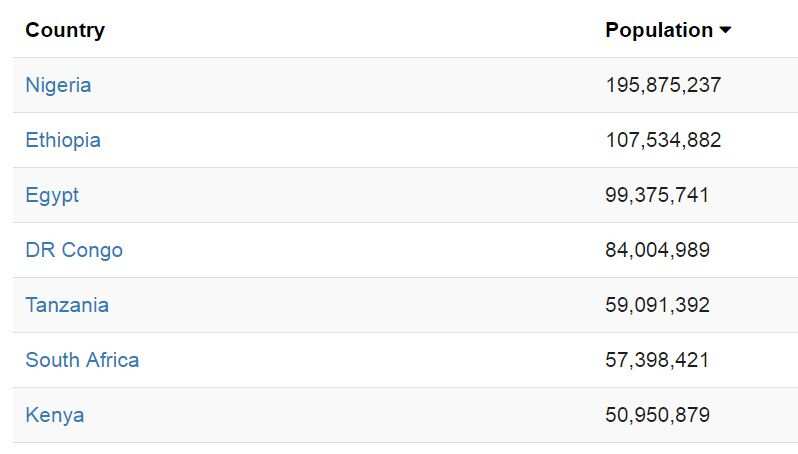What’s the most populous country in Africa by the end of 2018? With Christmas and New Year holidays approaching fast, it is curious to spend some minutes educating yourself about our continent and figuring out whether anything has changed since 2017.

Photo: how-to.ng
Highest Population Country
The whole world loves to follow news and reports about the most populated country in Africa, Europe, and other parts of the planet. Sometimes we can hear predictions that the countries from the top 3 places would soon get down to a lower position in this ranking, with some new territories taking the first and second place over as the next world's highest population countries.
Would this happen to Africa which is currently the 2nd biggest by area and 2nd most populated world’s continent? Has it already happened or not?
If we look at the statistics from previous years, we will easily understand which country has the largest population in Africa. It was like this a year ago, it was like this 5 years ago, and such situation remained the same even several decades ago.
READ ALSO: Biggest country in the world by population and land mass

Photo: thetrentonline.com
Which Country Has the Largest Population in Africa?
All Nigerians know the answer to the question, ‘What is the largest country in Africa by population?’ This answer is ‘Nigeria.’
Yes, millions of the citizens of our country are aware of the fact that they were born in the most populated country in Africa as of 2018. However, Nigeria is used to be at the top of the charts as the ‘most populous’ country because year after year the number of people who are born, live, and work here only grows.
If we look closely at the stats from this year, we’ll see the top 3 most populous countries in Africa (all information below is based on worldpopulationreview.com report):
- Nigeria – the population was about 173 million in 2013 and grew to over 195 million in 2018
- Ethiopia – the population is approximately 107 million people
- Egypt – the country has more than 99 million people
READ ALSO: Causes of overpopulation in Nigeria and its consequences

Top African countries by population; photo: worldpopulationreview.com
Now you can quickly say which country has the largest population in Africa, naming these top three territories with the biggest number of citizens. Since the demographic situation doesn’t seem to change much within the last several years, we can project that the similar figures will remain in 2019 and 2020.
Even if you look at the total population of the African continent, you won’t be surprised that Nigeria is the biggest country by the number of people who live here. Africa has approximately 1.2 billion people, and nearly one-sixth from this number is the total population of a single country – ours. Keep in mind that there are 53 other countries that are located on the same continent plus some additional non-recognized territories and independent states.
If we take into consideration the fact that Africa has the youngest citizens compared to other continents (the local median age is about 20 while the world’s median age is over 30), we can suggest that the population of Nigeria will continue to grow rapidly in the next several years.
READ ALSO: Factors affecting population growth in Nigeria

Map of Nigeria; photo: shutterstock
About Most Populated Country in Africa
While we all know really well that we live in the Federal Republic of Nigeria, it is worth mentioning that all the 190+ million citizens live in Abuja and the 36 states all across over 920,000 square kilometers. Because of so many factors, Nigeria is well known in the world as the ‘Giant of Africa.’
It is curious to see how the population of our country grew with time. If we glance at the old statistics, we would learn that there were around 30 million citizens back in the 1950s, about 50-55 million people back in the 1970s. The next decade increased this figure by another 15 million citizens, and by 1990s there were already more than 90-95 million countrymen. The millennium year impressed with the new record of over 125 million Nigerians, and this number kept growing and is still growing now, in 2018.
The most populous cities in Nigeria, such as Lagos, Benin, Ibadan, and others, account more than 2 million inhabitants each (the numbers can reach 10-12 million per biggest city). If judging by the age of women and men, about 40 percent of the nation is under 14 years old, about 20 percent is from 15 and to 24 years old, another 30 percent is from 25 and till 54 years old, and the rest are are 55-65 and older.
Since the explosive nation growth doesn’t seem to stop any time soon, Nigeria is predicted to reach over 500 million (or even 1 billion) population by 2100. This doesn’t even sound surprising if we keep in mind that every average woman from Nigeria usually gives birth to 4 children or even more.
We all live in the African most populous country, however, even though there are so many million people living here, Nigeria has an extremely low index for ‘human development.’ A lot of young and old people hope that this situation would soon change and the country with the most population would solve all the social problems and lead the society to a better future and more incredible life.
READ ALSO: Largest city in Nigeria by population and land mass
Source: Legit.ng